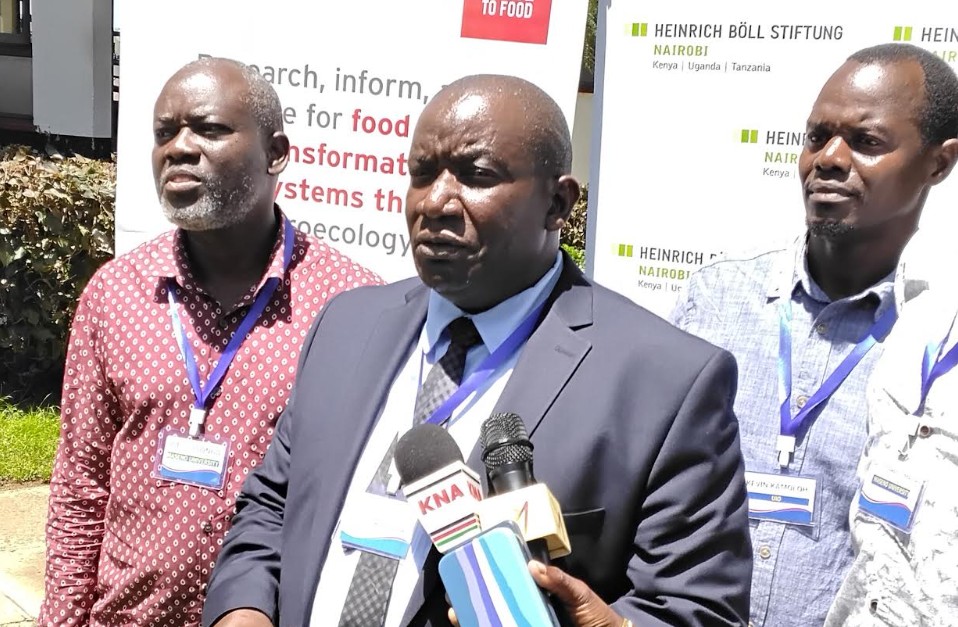The collaboration involves Maseno University, the University of Nairobi (UoN), the Kenya Medical Research Institute (KEMRI), the University of Oslo, the University of Dar es Salaam, Tanzania’s National Medical Research Institute, and Makerere University, among other institutions.
Their experts from across East Africa and Europe converged in Kisumu for an international symposium on pesticides, public health, and the environment amid growing calls to phase out highly hazardous pesticides and enforce national bans that remain largely unimplemented.
The three-day meeting, hosted by Maseno University in partnership with the University of Oslo, is part of a six-year research programme aimed at strengthening training and research in environmental and medical anthropology across East Africa.
Maseno University Deputy Vice-Chancellor in charge of Academics and Student Affairs, Prof. Eric Nyambedha, said the symposium brings together researchers, consumer advocates, farmers, policy experts, and civil society organisations to confront emerging evidence that pesticide residues are contaminating soil, water, and food supplies.
“The discussions are centred on soil health, food safety, and what this means for the people who consume food produced using pesticides,” said Prof. Nyambedha.
“We have participants from Europe and East Africa, including farmer representatives and consumer organisations, gathered here to discuss the environmental and health impacts of pesticide use.”
Civil society groups are using the forum to challenge governments in the region over weak enforcement of existing bans.
READ ALSO:
KUPPET raises alarm over 150 Kenyan teacher students stranded in Tanzania
Greenpeace Africa, which is researching the environmental footprint of pesticides in Kenya, South Africa, and Ghana, warned that despite recent bans on several hazardous products, many remain easily accessible in agro-vet shops.
“You will not see them displayed, but when you ask for them, they appear,” said Greenpeace Food Campaigner Elizabeth Opolo. We are banning these pesticides on food crops but still allowing them in greenhouses and for termite control. These toxins still end up in our soil, water, and bodies, making the ban meaningless if enforcement remains weak.”
Opolo revealed that Greenpeace will release a research report in December analysing pesticide monitoring systems, policy gaps, and enforcement failures across Kenya, South Africa, and Ghana.
She noted that while Kenya has made progress in public awareness and advocacy, environmental monitoring remains inadequate, with limited data on contamination of water bodies, soil ecosystems, and pollinators.
Farmers and civil society organisations also called for greater support for sustainable alternatives suited to small-scale producers. PELAM Kenya, which represents 69 farmer groups practising agroecology, said organic fertilisers and biopesticides are already available, locally tested, and effective, but lack sufficient policy backing and financial incentives.
“We cannot say alternatives do not exist,” said PELAM representative Jeff Kahuhu. “Our farmers are producing healthy food using organic methods. Scientists here have presented evidence of contamination in water and soil. The question is: how can we have all this data and still look the other way?”
Kahuhu added that agroecology and organic farming remain sidelined by agricultural policies that continue to favour conventional chemical inputs, despite growing public concern over pesticide-linked diseases and environmental degradation.
Other participants highlighted political and commercial interests behind pesticide use, saying farmers are often persuaded that toxic chemicals guarantee higher yields, even when safer and cheaper alternatives exist.
Many agricultural extension programmes, they noted, still promote conventional models that discourage experimentation with organic or bio-intensive methods.
Dr Harun Warui of the Heinrich Böll Foundation observed that the main challenge is no longer the lack of scientific evidence but the absence of political will and institutional enforcement.
He emphasised that since agriculture is a devolved function, county governments have a key role in implementing bans and regulations.
He cited Kajiado County, which is developing regulations to restrict the use of toxic chemicals, alongside Murang’a, West Pokot, and Makueni counties, which have already adopted agroecology policies. Nakuru County, he added, is expected to finalise its agroecology policy by the end of the month.
“The Cabinet Secretary withdrew 77 highly hazardous pesticides and restricted over 200 more. What remains is effective implementation. Counties must enforce national decisions, monitor pesticide use, and help farmers transition to safer practices,” Dr Warui said.
The symposium continues through tomorrow, with sessions focusing on food safety, pesticide monitoring, soil contamination, and the economic viability of organic alternatives.
Participants are expected to issue recommendations to governments, farmers, and regulatory agencies on strengthening pesticide governance, enforcing existing bans, and promoting agroecological transitions across the region.
By Fredick Odiero
You can also follow our social media pages on Twitter: Education News KE and Facebook: Education News Newspaper for timely updates.
>>> Click here to stay up-to-date with trending regional stories
>>> Click here to read more informed opinions on the country’s education landscape
>>> Click here to stay ahead with the latest national news.






